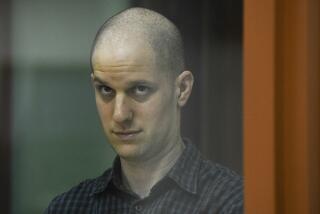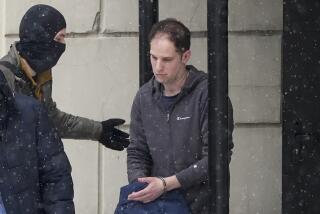Russian Bank Chief Tenders Resignation : Economics: Viktor S. Gerashchenko is blamed for ruble’s roller-coaster ride. Hard-liners in Parliament may not let him quit.
- Share via
MOSCOW — Russian Central Bank Chairman Viktor S. Gerashchenko, once branded “the world’s worst central banker,” offered his resignation Friday after a week of pandemonium in the Russian currency market.
The heavyset, jovial 57-year-old banker made the offer after a meeting with President Boris N. Yeltsin, who had asked Parliament to fire Gerashchenko earlier this week when the Russian ruble plunged nearly 25% in a single day. Less than 24 hours before the encounter, Gerashchenko had told the Parliament that he would not quit.
“I just hope the news (of the resignation) sticks, because this man has been a remarkable survivor despite three years of miserable, miserable economic policy,” said Harvard economist Jeffrey Sachs, a former economic adviser to Russia and author of the “worst central banker” label.
“His actions for four years, not just as head of the Russian Central Bank but earlier as head of the (Soviet) State Bank, did more to undermine public confidence in the currency than anything else,” Sachs said in a telephone interview Friday. “His untrustworthiness had become apparent to everyone again.”
Gerashchenko may not be gone yet, however. Only the Parliament can dismiss the Central Bank governor and appoint a replacement, and hard-line lawmakers said they will not accept the resignation.
“He is the last person left in power whom the majority of the Duma can fully trust,” nationalist lawmaker Sergei N. Baburin said. “The rest in the government have already stolen so much, and so openly.”
Russian reformers are pushing former liberal Finance Minister Boris G. Fyodorov as Gerashchenko’s replacement. Fyodorov said Friday that he would like the job, but nobody has offered it to him yet.
Some doubted that the anti-reform Parliament would approve Fyodorov, an uncompromising advocate of tight monetary policy and Western-style capitalism.
“To this day, reform in Russia is outward rather than real,” Fyodorov told business people in London earlier this week, the Itar-Tass news agency reported. “I want genuine reform.”
The ruble strengthened slightly Friday against the dollar, which closed down six rubles at 2,988.
However, in three days the Central Bank has spent more than $250 million of its dwindling hard-currency reserves to prop up the ruble. Demand for dollars remains strong from Russians who have learned not to trust their savings to the ruble.
Moreover, economists said the very expansionist monetary policies of the Central Bank this summer that led to the weakening of the ruble, as well as the panic itself, are nearly certain to push inflation much higher this fall, perhaps back up to 11% or 14% per month from a low of 4% in August.
That would undo most of Yeltsin’s achievements in bringing lower inflation and relative economic stability to his long-suffering citizens.
Russian and Western economists said Russia needs to stop printing money to bail out dying industries and inefficient farmers and to peg the ruble to a basket of Western currencies. Gerashchenko presided over two previous ruble stabilization efforts.
A 1991 currency reform wiped out most Russians’ savings. Then, in the summer of 1993, the Central Bank suddenly announced that all ruble notes issued before 1993 would be recalled--but each citizen was permitted to exchange about $28 worth of bills. Grandmothers stood in line for days trying to unload their meager savings before Yeltsin canceled the decree.
More to Read
Sign up for Essential California
The most important California stories and recommendations in your inbox every morning.
You may occasionally receive promotional content from the Los Angeles Times.













